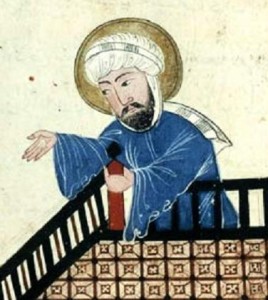1) Cultural taboos prevent Muslims from creating religious imagery. The Quran does not forbid any art form such as sculpting, painting, etc.
Diverse Muslim civilizations had depicted Prophet Muhammad and other holy figures in every art form imaginable for over a millennium. Over the past two centuries, the puritanical strain of Islam, Wahhabism seized the religious narrative and has all but obliterated an otherwise rich Islamic Art tradition.
34:13: “They worked for (Solomon) as he desired, making forts, statues, sculptures, paintings, pools, and boilers well-dug into the ground.”
and another encourages the enjoyment of the arts:
7:32 Say, “Who has forbidden the beauty and nice things God has brought forth for His servants, and the pure clean things of your choice?”
As to the depiction of religious figures, there is one restriction in the Quran that could be applied, and ironically enough, it is against blaspheming others’ religions:
6:108: “O Believers! Insult not the idols they set up besides God…”
Just imagine the different storyline if Muslims had responded with their own cartoons against Charlie Hebdo instead of letting terrorists hijack Islam’s reponse!
2) It is a common misconception that non-Muslims have to pay a special “non-believers’ tax,” called jizya, under a Muslim government. In reality, the Quran does not call for such an oppressive tribute:
 9:29: “Fight against those who reject belief in God and the Last Day, (and keep breaking treaties, 9:13)…until they pay jizya with willing submission.”
9:29: “Fight against those who reject belief in God and the Last Day, (and keep breaking treaties, 9:13)…until they pay jizya with willing submission.”
Jizya comes from the word jaza (“recompense”, see 18:106 for example) and hence means “war reparations”, not “tribute” as commonly mistranslated. The Medina Constitution written by Prophet Muhammad (S) gave non-Muslims equal rights and made no mention of a special tax. The Four Righteous Caliphs that succeeded Prophet Muhammad (S) did not extract any tribute from non-Muslims. Later, oppressive dictators did at different times burden non-Muslims with tribute, but the enlightened rulers of Muslim Spain never did for seven centuries.
The only financial obligation non-Muslims have in a true Islamic state is the Zakat (9:11), which in the early days of Islam was a variable income tax (see source) for all citizens, not a 2.5% charity. As a matter of fact, non-Muslims are considered “Brothers in Deen (the system of life)” if they pay Zakat and follow the same rules as Muslims. Read the “Brothers in Deen” essay for the evidence.
3) Does Islam really allow 4 wives? Why would God allow such an unnatural system? Classic example of Quranic guidance vs. Muslim practice.
 4:3: “If you (society) fear that you shall not be able to do justice with orphans, (as may happen when the welfare system is inadequate). In order to accommodate widows and orphans, men of sound finances and character shall be encouraged to marry these widows; two, three, and four (4:127). If you fear that you shall not be able to deal justly, then you must not take additional wives, and may continue with what you already have (4:129). This will prevent injustice and financial hardship.”
4:3: “If you (society) fear that you shall not be able to do justice with orphans, (as may happen when the welfare system is inadequate). In order to accommodate widows and orphans, men of sound finances and character shall be encouraged to marry these widows; two, three, and four (4:127). If you fear that you shall not be able to deal justly, then you must not take additional wives, and may continue with what you already have (4:129). This will prevent injustice and financial hardship.”
So polygamy is an emergency exception in Islam, not the norm. Besides, who wants 4 mothers-in-law?!



